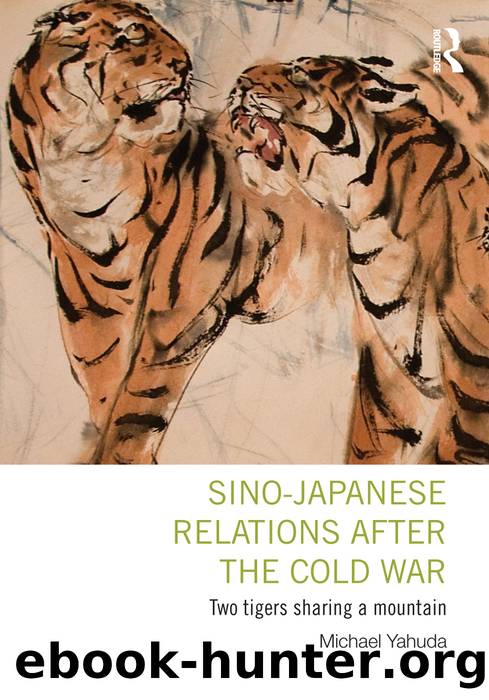Catalogue of the Plantin-Moretus Museum by Max Rooses & Museum Plantin-Moretus

Author:Max Rooses & Museum Plantin-Moretus [Rooses, Max & Plantin-Moretus, Museum]
Language: eng
Format: epub
Tags: History, General, Literary Collections
ISBN: 9780344006548
Google: gGC8vgEACAAJ
Goodreads: 19391562
Publisher: Creative Media Partners, LLC
Published: 2018-10-22T13:48:15+00:00
Cold politics and hot economics, 1993â2005
Any such hopes as Japanese leaders may have entertained about using their economic power to influence Chinese politics and foreign relations soon faded. The end of the Cold War and the dissolution of the Soviet Union was a strategic boon to China, as it no longer had any lingering fears of attack or invasion from the north while giving it greater strategic latitude in the long neglected maritime regions to the east and south. At the same time the adoption of patriotism as the basis for the CCPâs appeal to its people led to a new emphasis on a historic narrative of renewal and recovery from a hundred years of victimization by foreigners culminating in fifty years of Japanese aggression. This meant that Japan had to deal with a more assertive China that was bent on eliciting ever more fulsome apologies from the Japanese for their past aggression. It also resulted in greater insistence by Chinaâs leaders in demanding Japanese economic assistance as of right, as a kind of reparation for the wartime devastation.
Japan too was trying to come to terms with the new international environment, but it was overwhelmed by the collapse of its economic bubble in 1991 and by the end of the so-called San Francisco political system, which undermined the previous balance between the ruling conservative LDP and the opposition leftist JSP. The Japanese adjustment was not helped by the expectations of its strategic ally, the United States, on whom Japan continued to depend, that Japan would contribute more to regional and international security in military as well as in financial terms. Pressure built up on Japan as it was found wanting for contributing only financially to the American-led first Gulf War of 1990 and not at all to the first nuclear crisis with North Korea in 1993/94. In fact Japan claimed it could not even prevent the transfer of funds from Japan to North Korea. During this time, as we have seen in chapter 2, the Japanese, to simplify grossly, were debating as to whether they should seek to be the Great Britain or the Switzerland of East Asia.
It was in this context that the Japanese found that they totally failed in an attempt to use their economic leverage to persuade China to desist from carrying out nuclear tests, which were resumed on May 15, 1995 at a time when the Comprehensive Test Ban Treaty was about to come into force and when the other declared nuclear powers (with the notable exception of France) had already stopped carrying out such tests. Tokyo suspended a symbolic $75 million of grant assistance, only to be reprimanded by Beijing: how could Japan the historic aggressor have the temerity to protest at what the Chinese claimed was purely a defensive move on their part? The Chinese then proceeded to carry out two more tests in August and September. Outraged members of the LDP in the Diet called for the suspension of ODA, but the Ministry
Download
This site does not store any files on its server. We only index and link to content provided by other sites. Please contact the content providers to delete copyright contents if any and email us, we'll remove relevant links or contents immediately.
Learn Drawing Quickly by Sharon Finmark(2579)
The Husband's Secret by Liane Moriarty(2557)
Drawing and Painting Birds by Tim Wootton(2511)
The Unlikely Pilgrimage of Harold Fry by Rachel Joyce(2273)
Classical Drawing Atelier by Juliette Aristides(2087)
The Art of Creative Watercolor by Danielle Donaldson(1813)
One Drawing A Day by Veronica Lawlor(1804)
Oil Painting For Dummies by Anita Marie Giddings & Sherry Stone Clifton(1731)
Post-Impressionism by Nathalia Brodskaya(1710)
Hieronymus Bosch by Virginia Pitts Rembert(1670)
Elizabeth Is Missing by Emma Healey(1664)
Special Subjects: Basic Color Theory by Patti Mollica(1620)
Anywhere, Anytime Art: Crayon by Monika Forsberg(1592)
Woman's Mysteries by Esther Harding(1549)
Memory's Wake by Fenech Selina(1489)
Fundamentals of Drawing by Barrington Barber(1322)
Chinese Brush Painting by Jane Evans(1295)
Landscape Painting in Pastel by Elizabeth Mowry(1287)
Acrylic Fusion by Dan Tranberg(1280)
